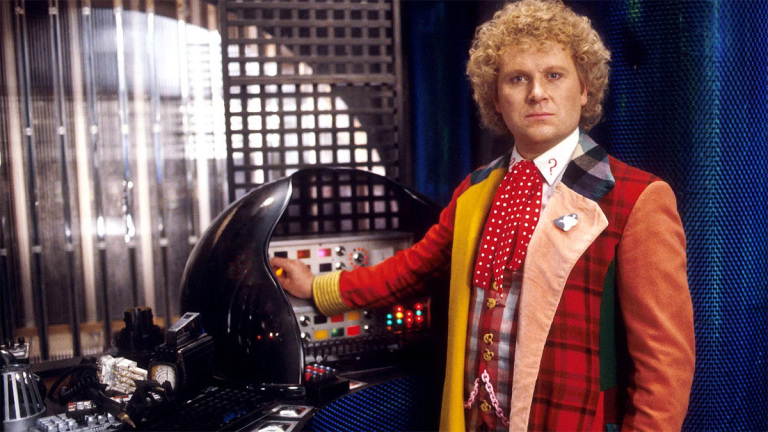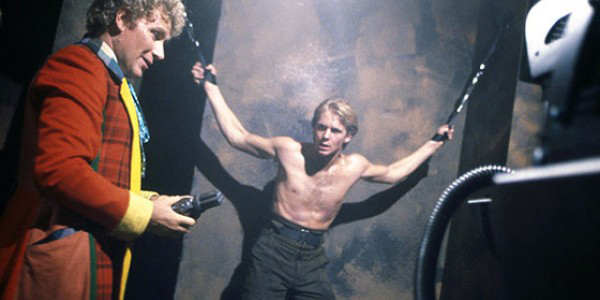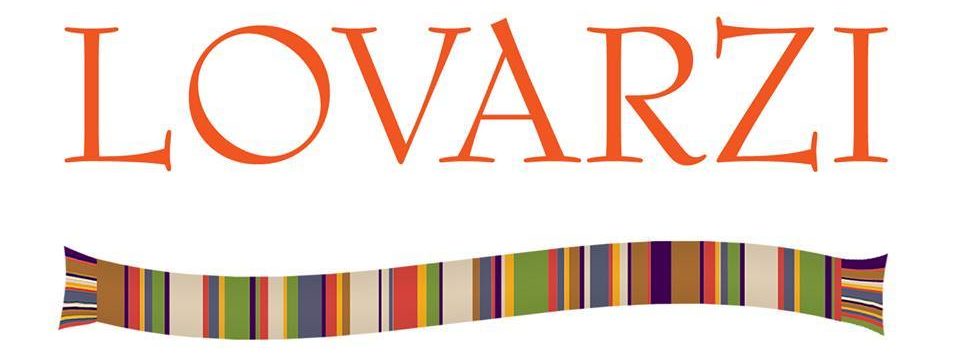The word ‘hiatus’ strikes terror into the (twin) hearts of many Doctor Who fans. It points to the dark period in the mid 80s when the Time Lord’s travels were dramatically halted. Just why was Doctor Who cancelled in 1985?

The answer to that question is not simple, and indeed has been the subject of much scrutiny over the years; the documentary on the BBC’s official ‘The Trial of a Time Lord’ DVD goes some way to explaining why Doctor Who was cancelled, and we’ll attempt to summarise its findings.
To have Doctor Who cancelled in 1985 was unexpected, to say the least. Just two years earlier, the programme had been flying high with its 20th anniversary celebrations, including TV repeats of classic stories, and a feature-length, multi-Doctor special airing on BBC One entitled ‘The Five Doctors.’ The show, it seemed, had never been more popular.
And whilst the ratings of the 1985 season were very healthy (with episodes pulling in an average of 7 million viewers) there had been a change of management at the BBC. The newly-appointed BBC One Controller Michael Grade was open about his dislike of the show, and in a subsequent TV interview on the programme Room 101, he said: “I thought it was rubbish. I thought it was pathetic. I mean I’d seen Star Wars, and I’d seen Close Encounters, and ET, and then I had to watch these cardboard things probably clonking across the floor trying to scare the kids. I mean, you just sit and laugh at it.”
His mission to see Doctor Who cancelled, therefore, was clear – and one that was supported by the BBC’s Head of Series and Serials Jonathan Powell, who was also unfavourable towards the show.
In the BBC documentary, Powell explains that he felt Doctor Who was dying through neglect and a lack of inspiration, and that it had gotten into a vicious circle in that it wasn’t successful and therefore wasn’t given more money to increase its production values, and therefore continued to be unsuccessful. Therefore, as Powell saw it, the best way forward was to have Doctor Who cancelled.
At the same time, the BBC was keen to invest in new productions, and it’s worth noting that – in this turbulent period – a number of programmes launched that are still running to this day, including the soap opera Eastenders and the medical drama Casualty. Certainly, there would have been more money available for these shows with Doctor Who cancelled. As Powell explains, it wasn’t at the top of the BBC’s agenda to rejuvenate the programme, as they wanted to do other things.
At the same time, other criticisms were levelled at Doctor Who‘s content. According to the script editor Eric Saward – speaking in an interview with Starburst in 1986 – he believes that, “We were simply taken off because they thought we were awful.” He was told little else, other than “it was thought the show needed resting, re-thinking.” Saward adds: “We were told we were going back to [the 25 minute episode format], which was Michael Grade’s decision, and that more comedy was wanted. I must admit that I didn’t understand Grade’s note about comedy, last season we had three very comic stories (‘Vengeance on Varos,’ ‘Two Doctors,’ ‘Revelation of the Daleks.’)”

So is this the real reason for having Doctor Who cancelled, the lack of comedy? Certainly, the 1985 season had some grittier – perhaps more violent – moments, and Saward remarks on the BBC documentary that he had wanted to “release the handbrake” on violence, adding that he felt that it should be shown to be real.
That being said, Saward adds in the same documentary that he doubts this was Grade’s reasoning for having Doctor Who cancelled. He says that those explanations about violence weren’t given until much later, when people were searching for reasons for taking the programme off the air.
But was Doctor Who cancelled, in truth? As we all know, the show came back for a 23rd season in 1986, and it wasn’t long before the narrative coming out of the BBC was that the programme would be going on an 18 month hiatus, as opposed to being outright shelved.
This point is confirmed in Grade’s Room 101 interview. “There was a huge press campaign to save Doctor Who, and when newspapers get a lot of letters on a subject, they think it’s a hot topic. They got thousands and thousands of letters from the three fans who were up all night writing thousands and thousands of letters. And I was up before the BBC board of governors for this thing. And the upshot of it all was that I did cancel it; it came back eventually, after I’d gone.”

So it seems that Grade tried to have Doctor Who cancelled, but a public outcry reversed the decision. And it was certainly a loud outcry; Powell notes in the BBC documentary that Doctor Who fans had threatened to picket the Houses of Parliament with Daleks unless the programme was reinstated. And Doctor Who‘s producer John Nathan-Turner had the idea of releasing a charity record to raise awareness for the show’s cause.
(Intriguingly, the music for the record – titled ‘Doctor in Distress’ – was written by the (now) renowned film composer Hans Zimmer, with the lyrics being penned by long-time Doctor Who fan and record producer Ian Levine. It didn’t chart, however, and according to a note in The Sixth Doctor Handbook by by David J Howe, Mark Stammers and Stephen James Walker, the BBC refused to play the song due to its low quality. So even if the record wasn’t the sole influence on the reversal of the BBC’s decision, it is certainly an interesting anecdote in the history of Who.)
In short, the reasons for having Doctor Who cancelled in 1985 are complex. Michael Grade’s remarks about simply thinking the show was “rubbish” may be as close to a single, all-encompassing explanation as to his reasoning.
But as the (then) incumbent Doctor Colin Baker cryptically points out at the end of the BBC documentary: “It’s not just optimism on my part that thinks that’s not the whole story.”

Doctor Who scarf – order now from the Lovarzi shop!


it was cancelled in 1989, not 1985.
-Great journalism
It was cancelled in 1985 and reinstated in 1986.
It was cancelled in 1985 and reinstated in 1986.